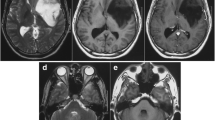Abstract
A 74-year-old woman presented with seizures and change in mental status. An MRI of the brain revealed a single ring-enhancing 1.6 ?× ?2.1 ?× ?2.1 cm mass with surrounding prominent edema in the deep white matter of the left posterior parietal region. The radiological differential diagnosis was a high grade glioma versus a metastatic malignancy. She had been debilitated all of her life due to brain damage during birth, with related hearing loss and mental retardation. There was no significant family history. On admission, her vital signs were unremarkable and no palpable masses were identified in the body, including her breasts. The laboratory data were unremarkable. She underwent craniotomy for gross total excision of the tumor. Histologic examination showed a metastatic, poorly differentiated adenocarcinoma with massive necrosis. Immunohistochemically, the tumor cells were diffusely and strongly positive for cytokeratin 7 (CK-7) (basic cytokeratin found on specific epithelia, such as breast, lung, and gastric cancers) and mammaglobin (breast marker); focally positive for p63 and CA125 (urothelial markers), CD10 and PAX-2 (renal cell markers), and gross cystic disease fluid protein (GCDFP)-15 (breast marker); and negative for CK-20 (colonic and urothelial marker), CDX-2 (colonic marker), CA19-9 (pancreatic marker), TTF-1 (thyroid and lung marker), GFAP (glial marker), S-100 protein (neural and melanoma marker), RCC (renal cell marker), and WT-1 (ovarian marker). As a metastatic evaluation, a CT scan of the thorax, abdomen, and pelvis was performed, and revealed no suspected primary or secondary malignancies. The patient did not cooperate for mammography. By bilateral breast ultrasonography, a 1.5 cm solid mass was detected in her left breast. Her family decided against further invasive procedures for diagnostic purposes.
Access this chapter
Tax calculation will be finalised at checkout
Purchases are for personal use only
Similar content being viewed by others
References
Abbruzzese JL, Abbruzzese MC, Lenzi R et al (1995) Analysis of a diagnostic strategy for patients with suspected tumors of unknown origin. J Clin Oncol 13:2094–2103
Greco FA, Pavlidis N (2009) Treatment for patients with unknown primary carcinoma and unfavorable prognostic factors. Semin Oncol 36:65–74
Hainsworth JD, Fizazi K (2009) Treatment for patients with unknown primary cancer and favorable prognostic factors. Semin Oncol 36:44–51
Pavlidis N, Fizazi K (2009) Carcinoma of unknown primary (CUP). Crit Rev Oncol Hematol 69:271–278
National Comprehensive Cancer Network (NCCN). Occult Primary (Cancer of Unknown Primary). http://www.nccn.org/professionals/physician_gls/f_guidelines.asp/. Accessed 16 May 2011
Bishop JF, Tracey E, Glass P et al (2007) Prognosis of sub-types of cancer of unknown primary (CUP) compared to metastatic cancer. J Clin Oncol 25:21010
Monzon FA, Koen TJ (2010) Diagnosis of metastatic neoplasms: molecular approaches for identification of tissue of origin. Arch Pathol Lab Med 134:216–224
Rosenfeld N, Aharonov R, Meiri E et al (2008) MicroRNAs accurately identify cancer tissue origin. Nat Biotechnol 26:462–469
Pillai R, Deeter R, Rigl CT et al (2011) Validation and reproducibility of a microarray-based gene expression test for tumor identification in formalin-fixed paraffin-embedded specimens. J Mol Diagn 13:48–56
Monzon FA, Ogino S, Hammond ME et al (2009) The role of KRAS mutation testing in the management of patients with metastatic colorectal cancer. Arch Pathol Lab Med 133:1600–1606
Varadhachary GR, Raber MN, Matamoros A et al (2008) Carcinoma of unknown primary with a colon-cancer profile-changing paradigm and emerging definitions. Lancet Oncol 9:596–599
Pentheroudakis G, Golfinopoulos V, Pavlidis N (2007) Switching benchmarks in cancer of unknown primary: from autopsy to microarray. Eur J Cancer 43:2026–2036
Pentheroudakis G, Greco FA, Pavlidis N (2009) Molecular assignment of tissue of origin in cancer of unknown primary may not predict response to therapy or outcome: a systematic literature review. Cancer Treat Rev 35:221–227
Anderson GG, Weiss LM (2010) Determining tissue of origin for metastatic cancers: meta-analysis and literature review of immunohistochemistry performance. Appl Immunohistochem Mol Morphol 18:3–8
Ismael G, de Azambuja E, Awada A (2006) Molecular profiling of a tumor of unknown origin. N Engl J Med 355:1071–1072
Ma XJ, Patel R, Wang X et al (2006) Molecular classification of human cancers using a 92-gene real-time quantitative polymerase chain reaction assay. Arch Pathol Lab Med 130:465–473
bioTheranostics. CancerTYPE ID®. Changing the way you identify cancer. http://www.biotheranostics.com/healthcare-professionals/hcp/ctid/. Accessed 16 Aug 2010
Moraleda J, Grove N, Tran Q et al (2004) Gene expression data analytics with interlaboratory validation for identifying anatomical sites of origin of metastatic carcinomas. J Clin Oncol 22:9625
Monzon FA, Lyons-Weiler M, Buturovic LJ et al (2009) Multicenter validation of a 1,550-gene expression profile for identification of tumor tissue of origin. J Clin Oncol 27:2503–2508
Li J, Smyth P, Flavin R et al (2007) Comparison of miRNA expression patterns using total RNA extracted from matched samples of formalin-fixed paraffin-embedded (FFPE) cells and snap frozen cells. BMC Biotechnol 7:36
Prometheus. ProOnc TumorSourceDx™. http://www.prooncdiagnostics.com/hcp/pro-onc-tumor-source-dx.aspx. Accessed 16 Aug 2010
Dennis JL, Hvidsten TR, Wit EC et al (2005) Markers of adenocarcinoma characteristic of the site of origin: development of a diagnostic algorithm. Clin Cancer Res 11:3766–3772
Bahrami A, Truong LD, Ro JY (2008) Undifferentiated tumor: true identity by immunohistochemistry. Arch Pathol Lab Med 132:326–348
Hainsworth JD, Spigel DR, Rubin MS et al (2010) Treatment of carcinoma of unknown primary site (CUP) directed by molecular profiling diagnosis: a prospective, phase II trial. J Clin Oncol 28:suppl; Abstract 10540
Lebanony D, Benjamin H, Gilad S et al (2009) Diagnostic assay based on hsa-miR-205 expression distinguishes squamous from nonsquamous non-small-cell lung carcinoma. J Clin Oncol 27:2030–2037
Author information
Authors and Affiliations
Corresponding author
Editor information
Editors and Affiliations
Rights and permissions
Copyright information
© 2011 Springer-Verlag Berlin Heidelberg
About this chapter
Cite this chapter
Takei, H., Monzon, F.A. (2011). Carcinoma of Unknown Primary. In: Schrijver, I. (eds) Diagnostic Molecular Pathology in Practice. Springer, Berlin, Heidelberg. https://doi.org/10.1007/978-3-642-19677-5_30
Download citation
DOI: https://doi.org/10.1007/978-3-642-19677-5_30
Published:
Publisher Name: Springer, Berlin, Heidelberg
Print ISBN: 978-3-642-19676-8
Online ISBN: 978-3-642-19677-5
eBook Packages: MedicineMedicine (R0)




